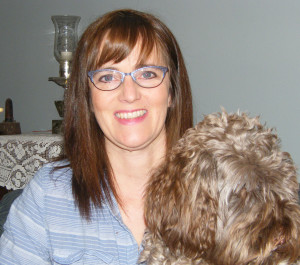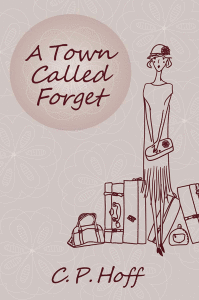An interview with Connie Penner, author of A Town Called Forget
Connie Penner, author of the debut novel, A Town Called Forget, took some time to talk to us about the novel and her process.

Q: Whatever inspired you to come up with the title A Town Called Forget?
CP: There is a little French town, not far from where I was born, the spelling is the same but the French pronunciation is different. I thought it was a delightful name for a story. Although the landscape of the fictional Forget is very different.
Q: So, besides the charming town, what was the inspiration for this madcap story?
CP: My twenties were particularly difficult for me, so when I began writing Forget I got quite lost in it. In some ways it was so different from my situation and in others it was very much the same. I was able to incorporate some family stories and quirks that only those close to me would recognize. For me the story was healing. A place to laugh.
Q: Can you describe your ideal reader, and for fun, can you write them as you would a character?
CP: My ideal reader has to be someone who could have tea with the Fords and find the experience delightful.
Ella and Emma Ford, young for their ninety-some-odd years, took turns reading from the Eaton’s catalogue’s dog-eared pages. They had taken to passing the evening with it since they had shipped off their Bible in the Great War. The holy book had been sent to an unknown soldier, so if he could read English, he might find solace. If he couldn’t read English or find solace at least he’d have something to trade for cigarettes. That’s why, in the sister’s minds, it was such a practical book. A book for any occasion, but now the catalogue would have to do.
“Can you read that last bit without the vowels?” Emma asked.
“I don’t think that’s a good idea,” said Ella. “It will sound too foreign.”
“Oh, use your Hungarian accent, Hungarians can’t afford vowels.”
Q: How long did it take for you to write the novel?
CP: About 20 years. I wrote and rewrote it, let it sit on the shelf for a few years and rewrote it again. Every time I learned something about the craft of storytelling I tried to incorporate that knowledge.
Q: Were there specific authors who have informed your style?
CP: That’s a hard question. I’ve been influenced by many authors. Some I’ve liked, others I haven’t. And my favourite often is the one who has carried me away at the time. If their words feel like music, they have me. It is a skill I would love to have.
Q: There are so many memorable characters in A Town Called Forget. For you, was there a favourite?
CP: I would have to say Aunt Lily. My heart hurts for her. We have all been the unlovelies of our own lives, but that poor dear has made a career of it. And I don’t think she can bring herself to live any other way. I’m a little protective of her.
Q: Among that host of unforgettable characters, was there also one you disliked?
CP: I don’t think I dislike any of my characters. But I would avoid the grocer’s wife. I’m sure she would point out more of my faults than even the most dedicated of mother-in-laws.
Q: In the process of writing, what for you came the easiest?
CP: The humour. Sometime I got so carried away, that I went quite off track.
Q: And the hardest?
CP: The plot. The first few drafts didn’t have much of one. I was having too much fun with the characters. To settle down and keep the fun while adding substance was hard for me. It was like telling a child to scrub behind their ears.
Q: Can you tell us how you were signed to Five Rivers?
CP: I heard about Five Rivers from a friend. Sent them my manuscript and two editors I know, Elizabeth McLachlan and Lesley Little, talked to Robert Runté on my behalf and he in turn talked to Lorina. My manuscript skipped to the top of the pile. It was rejected with recommendations on how to improve the story. After cleaning it up the best I could, I resubmitted and on the second pass it was accepted.
Q: And next? What are you planning for the future?
CP: I’m in a mentorship program with Gail Anderson-Dargatz. I’ve worked with her before, it was amazing. This time I don’t expect it to be any different.
 A Town Called Forget releases August 1, 2016 in both print and digital, and is available now for pre-order through Five Rivers and online booksellers worldwide. We think you will find A Town Called Forget unforgettable.
A Town Called Forget releases August 1, 2016 in both print and digital, and is available now for pre-order through Five Rivers and online booksellers worldwide. We think you will find A Town Called Forget unforgettable.